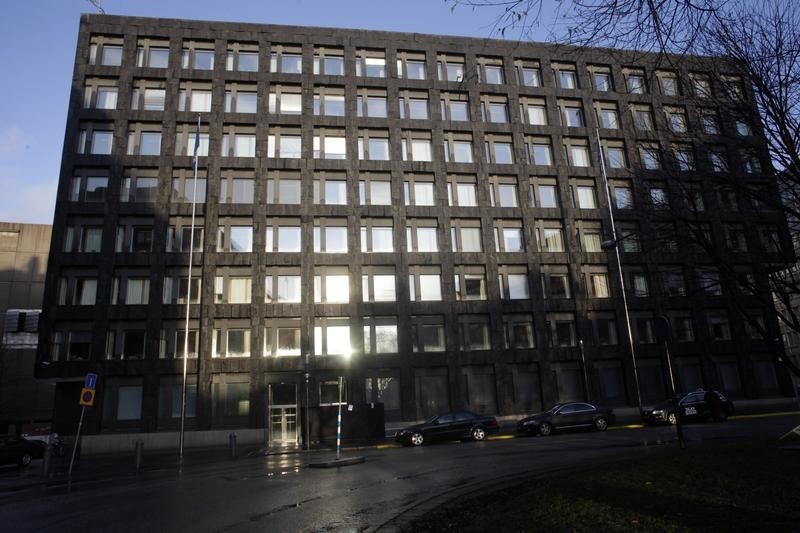By Johan Ahlander and Simon Johnson
STOCKHOLM (Reuters) - Sweden's central bank kept its lending rates on hold on Wednesday after signs of an uptick in inflation and stronger economic growth, surprising markets which had expected a further cut into negative territory.
The Riksbank expanded bond buying and pushed monetary tightening further into the future, but left the key repo rate at -0.25 percent, welcome news for Swedish banks which had started to complain that ultra-loose monetary policy could put financial stability at risk.
Sweden is battling a deflationary threat just as it enjoys one of Europe's strongest growth rates, accompanied by concerns about a housing bubble and one of the region's highest household debts. This poses a dilemma for central bankers.
"The expansionary monetary policy is having a positive impact on the Swedish economy and inflation has begun to rise, the Riksbank said in a statement.
Data showed inflation picked up slightly in March - the second month in a row when headline prices increased on an annual basis and a better result than the Riksbank had expected while economy grew at 2.7 percent in the fourth quarter, the fastest pace in more than three years.
Swedish banks have seen interest rate margins come under pressure from negative rates, first introduced by the Riksbank in March.
"We believe the negative rate overshoots the target and may even jeopardise growth and productivity," Swedbank CEO Michael Wolf said, calling for more investment in housing and other measures including requiring Swedes to repay mortgage capital.
But in the first quarter, banks were largely compensated as customers sought more hedging and risk management services due to market volatility.
Both Handelsbanken (ST:SHBa) and Nordea (ST:NDA) beat market expectations when they reported earlier on Wednesday. Nordea's operating profit rose to 1.41 billion euros while Handelsbanken came in at 4.96 billion Swedish crowns (£384.2 million).
Still, Nordea's shares fell around 3 percent on Wednesday, with worries trading income was not stable enough.
"It's not something you can count on in the next quarter," said Anderas Hakansson, banking analyst at Exane BNP Paribas (PARIS:BNPP). "The Handelsbanken report, on the other hand, was strong throughout," he added.
For a graphic on Swedish repo rate and inflation: http://link.reuters.com/jef24s
For a graphic Swedish GDP growth: http://link.reuters.com/ryv82whttp://link.reuters.com/pur65s
KEEPING THE POWDER DRY
Banks may still face a further rate cut, especially if the crown strengthens. Average yearly inflation in 2015 is forecast at only 0.3 percent. The Riksbank itself said it was "highly prepared" to be more expansionary if necessary - including in between regular policy meetings.
"They try to keep the powder dry and to take other measures and to give confidence to the market that it still has the arsenal to do more to weaken the currency," said Elisabeth Andreae, an economist at Commerzbank (XETRA:CBKG) in Frankfurt.
Complicating matters for the Riksbank is the Swedish crown, which strengthened sharply after Wednesday's rate decision (EURSEK=). The bank is worried a strong crown will subdue inflation expectations as key wage national negotiations begin.
"It is a balancing act," Nordea CEO Christian Clausen told Reuters. "The Swedish economy has no need for negative interest rates but if they don't do anything, we might see the crown strengthen and inflation fall."
"You have to find the way precisely between Europe and the Swedish economy. The Swedish economy suggests the need for higher interest rates and Europe suggests lower rates."
Other central banks have also had extremely loose monetary policy but may start to tighten. The Bank of England is moving closer to rate hikes and the U.S. Federal Reserve is also seen tightening policy even though inflation remains stubbornly low.
While keeping rates on hold, the Riskbank said it would buy 40 billion to 50 billion crowns' of government bonds on top of ongoing 40 billion crowns of purchases.

The bank warned about household debt, calling on authorities to do more. Efforts to rein in the housing market were hit this month when courts blocked the Financial Supervisory Authority's attempt to force Swedes to pay capital on mortgages.